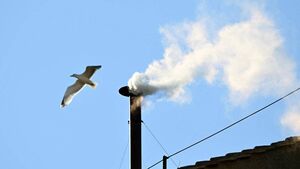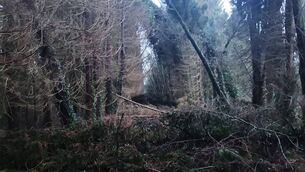Fallon's Town Talk: Conclave doesn’t conform to demands of modern media

White smoke rising from the chinmey of the Sistine Chapel signaling that cardinals elected a new pope during their conclave in the Vatican on May 8, 2025. (Photo by Tiziana FABI / AFP)
Just after five o’clock on a gloriously sunny afternoon last Thursday, I switched on Sky News which was showing live coverage of Donald Trump droning on about a trade deal between the US and the UK. More notably, in the corner of the screen they had an insert of the chimney of the Sistine Chapel.
Maybe Sky News had the chimney as a backdrop to its news coverage all day, or perhaps it was just in the top-right corner of the television screen throughout the afternoon as the result of the third and fourth ballots of the conclave to elect the successor to Pope Francis drew closer.
Trump’s ramblings quickly became boring so I lost interest. Then, suddenly, Trump couldn’t be heard anymore as the news anchor interrupted the live feed from the White House. In the corner of the screen, white smoke was billowing from the chimney in Rome. It was 5.07 p.m. and the attention of the world’s media switched, in the blink of an eye, from Washington to Rome.
This was history happening before our eyes. There was something deliciously ironic about this centuries-old ritual of electing a new pope knocking a US president, who is obsessed with dominating the news cycle, into the margins.
The excitement was palpable as we waited to find which of the papabile candidates had been elected. Even for people who aren’t religious at all, white smoke emerging from the Sistine Chapel has a sense of theatre that is hard to match.
In a world obsessed with instant news, a papal conclave doesn’t conform; it possesses a timeless mystique which is rare in the modern world. For over 24 hours, over the course of four ballots, nobody outside the conclave knew what was happening. Traditional media and social media were in the same boat as everyone else.
The drama continued for another hour as the world waited to find out which cardinal had been chosen. RTÉ and BBC both interrupted their schedules and, as the excitement intensified, their respective panels of experts speculated on who the new pontiff might be. Many expressed surprise at how quickly the conclave had concluded but it was in keeping with the timespan of three of the last four elections.
Soon after six o’clock, the doors leading onto the balcony of St. Peter’s Basilica opened. I had switched to RTÉ 1 for the big moment, but, after consistently excellent coverage of all events papal since the death of Pope Francis on Easter Monday, they faltered.
News anchor Sharon Tobin was uncharacteristically unsure. When the doors opened Sharon told viewers that the new pope was emerging on the balcony. You could hear her panellists telling her it was, in fact, the Cardinal Protodeacon – the prelate who announces the result.
The cardinal was difficult to hear but the identity of the new pope didn’t sound familiar from the list of pre-election favourites. I worked out that the name he had taken was Leo XIV, but what was surprising was the RTÉ panel wasn’t sure either.
It took quite a few seconds before they worked out that the new pontiff was Cardinal Robert Prevost from the USA. In fairness, once the RTÉ panel realised who it was, they were quickly filling in the audience about his background and personality. The consensus view was Leo would continue along the path forged by Francis.
Prevost wasn’t among the leading contenders and an outsider at 40/1. Sports reporters who are accustomed to getting their predictions badly wrong (and I was that soldier back in the day) felt the pain of expert Vatican watchers who must have been in shock on Thursday evening.
Pope Leo made a few significant gestures in his first appearance. He dressed in the traditional colourful papal garments, as opposed to the white vestments Francis favoured throughout his pontificate. Despite being from Chicago (and, apparently, a Chicago Bears fan), he spoke in Italian and Spanish rather than English.
Pope Leo is aged 69. If he lives as long as Francis did, the Catholic Church is in for a long pontificate. Once the initial excitement subsides, Leo faces a daunting task in uniting the, at times, widely divergent strands of a flock which totals 1.4 billion people.
It is over 100 years ago since the English poet, AE Housman, wrote a short poem called ‘The Pope’. Its opening line reads: “It is a fearful thing to be the Pope”. All these years later, many Catholics will agree with Housman’s sentiments but will also wish Leo well in his momentous challenge.





